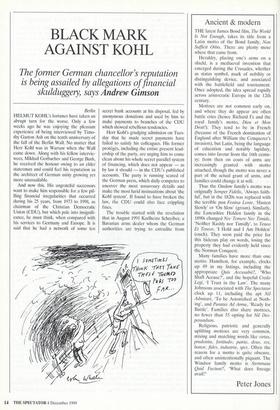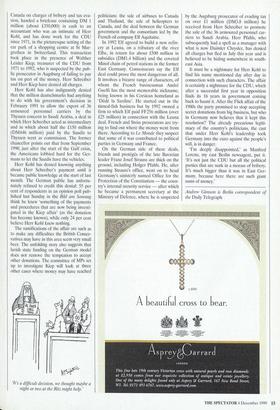BLACK MARK AGAINST KOHL
The former German chancellor's reputation is being assailed by allegations of financial skulduggery, says Andrew Gimson
Berlin HELMUT KOHL's fortunes have taken an abrupt turn for the worse. Only a few weeks ago he was enjoying the pleasant experience of being interviewed by Timo- thy Garton Ash on the tenth anniversary of the fall of the Berlin Wall. No matter that Herr Kohl was in Warsaw when the Wall came down. Along with his fellow intervie- wees, Mikhail Gorbachev and George Bush, he received the honour owing to an elder statesman and could feel his reputation as the architect of German unity growing yet more unassailable.
And now this. His ungrateful successors want to make him responsible for a few pif- fling financial irregularities that occurred during his 25 years, from 1973 to 1998, as chairman of the Christian Democratic Union (CDU), but which pale into insignifi- cance, he must think, when compared with his services to Germany and Europe. It is said that he had a network of some ten secret bank accounts at his disposal, fed by anonymous donations and used by him to make payments to branches of the CDU which showed rebellious tendencies.
Herr Kohl's grudging admission on Tues- day that he made secret payments have failed to satisfy his colleagues. His former proteges, including the entire present lead- ership of the party, are urging him to come clean about his whole secret parallel system of financing, which does not appear — as by law it should — in the CDU's published accounts. The party is running scared of the German press, which daily competes to uncover the most unsavoury details and make the most lurid insinuations about 'the Kohl system'. If found to have broken the law, the CDU could also face crippling fines.
The trouble started with the revelation that in August 1991 Karlheinz Schreiber, a Bavarian arms dealer whom the German authorities are trying to extradite from Canada on charges of bribery and tax eva- sion, handed a briefcase containing DM 1 million (about £350,000) in cash to an accountant who was an intimate of Herr Kohl, and has done work for the CDU since 1971, in the picturesque setting of the car park of a shopping centte at St Mar- grethen in Switzerland. This transaction took place in the presence of Walther Leisler Kiep, treasurer of the CDU from 1971 to 1992, who is suspected by the pub- lic prosecutor in Augsburg of failing to pay tax on part of the money. Herr Schreiber and Herr Kiep have denied all charges.
Herr Kohl has also indignantly denied that the million deutschmarks had anything to do with his government's decision in February 1991 to allow the export of 36 armoured personnel carriers by the Thyssen concern to Saudi Arabia, a deal in which Herr Schreiber acted as intermediary and in which about half the £150 million (DM446 million) paid by the Saudis to Thyssen went as commission. The former chancellor points out that from September 1990, just after the start of the Gulf crisis, the Americans lobbied hard for the Ger- mans to let the Saudis have the vehicles.
Herr Kohl has denied knowing anything about Herr Schreiber's payment until it became public knowledge at the start of last month. The German public has unfortu- nately refused to credit this denial: 55 per cent of respondents in an opinion poll pub- lished last Sunday in the Bad am Sonntag think he knew 'something of the payments and procedures that are now being investi- gated in the Kiep affair' (as the donation has become known), while only 24 per cent believe Herr Kohl knew nothing.
The ramifications of the affair are such as to make any difficulties the British Conser- vatives may have in this area seem very small beer. The unfolding story also suggests that lavish state funding on the German model does not remove the temptation to accept other donations. The committee of MPs set up to investigate Kiep will look at three other cases where money may have reached It's a difficult decision, we thought maybe a night or two at the Ritz might help.' politicians: the sale of airbuses to Canada and Thailand, the sale of helicopters to Canada, and the deal between the German government and the consortium led by the French oil company Elf Aquitaine.
In 1992 Elf agreed to build a new refin- ery at Leuna, on a tributary of the river Elbe, in return for about £500 million in subsidies (DM1.4 billion) and the coveted Minol chain of petrol stations in the former East Germany. Connoisseurs say the Elf deal could prove the most dangerous of all. It involves a bizarre range of characters, of whom the French businessman Andre Guelfi has the most memorable nickname, being known in his Corsican homeland as Tea la Sardine'. He started out in the tinned-fish business but by 1992 owned a firm to which Elf paid FF256 million (over £25 million) in connection with the Leuna deal. French and Swiss prosecutors are try- ing to find out where the money went from there. According to Le Monde they suspect that some of it was contributed to political parties in Germany and France.
On the German side of these deals, friends and proteges of the late Bavarian leader Franz Josef Strauss are thick on the ground, including Holger Pfahls, He, after running Strauss's office, went on to head Germany's sinisterly named Office for the Protection of the Constitution — the coun- try's internal security service — after which he became a permanent secretary at the Ministry of Defence, where he is suspected by the Augsburg prosecutor of evading tax on over £1 million (DM3.8 million) he received from Herr Schreiber to promote the sale of the 36 armoured personnel car- riers to Saudi Arabia. Herr Pfahls, who subsequently had a spell as a manager with what is now Daimler Chrysler, has denied all charges but fled in July this year and is believed to be hiding somewhere in south- east Asia.
It must be a nightmare for Herr Kohl to find his name mentioned day after day in connection with such characters. The affair is certainly a nightmare for the CDU, which after a successful first year in opposition finds its 16 years in government coming back to haunt it. After the Flick affair of the 1980s the party promised to stop accepting secret donations from big business, but who in Germany now believes that it kept this resolution? The already precarious legiti- macy of the country's politicians, the cast that under Herr Kohl's leadership took Germany into the euro against the people's will, is in danger.
'I'm deeply disappointed,' as Manfred Lorenz, my east Berlin newsagent, put it. 'It's not just the CDU but all the political parties that are sunk in a morass of bribery. It's much bigger than it was in East Ger- many, because here there are such giant sums of money.'
Andrew Gimson is Berlin correspondent of the Daily Telegraph.



















































































 Previous page
Previous page